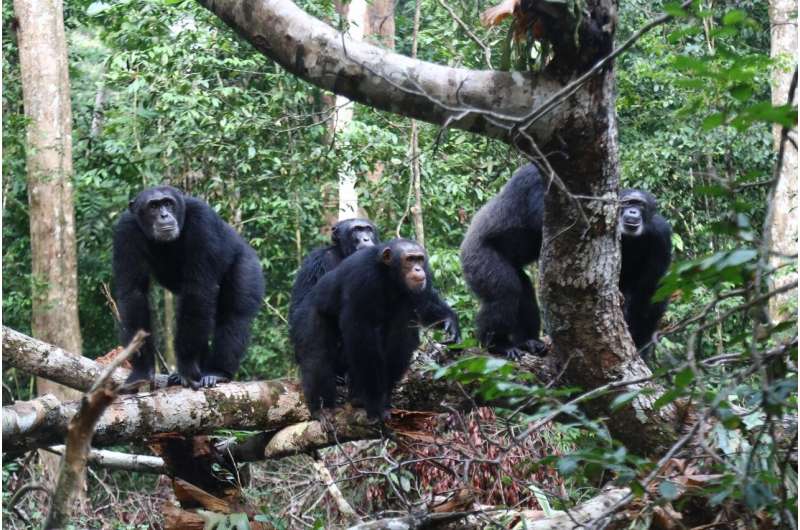Less offspring due to territorial conflicts

Both humans and chimpanzees can be extremely territorial, and territorial disputes between groups can turn violent, with individuals killing each other. In humans, such between-group competition can escalate to war and devastating loss of human life. Researchers from the Max Planck Institute for Evolutionary Anthropology studied wild Western chimpanzees to find out whether territorial behavior may have shaped counter-strategies. One important strategy that is evident in both humans and chimpanzees, but rare in the rest of the animal kingdom, is the capacity to work together in order to achieve a goal, for example to defend a territory—even if it is together with individuals who are not one's kin.
The researchers tested whether the effects of territoriality—the pressure that neighboring groups exert on each other on one side, and the competitive capacity of a group on the other side—impact female reproductive success. Reproductive success is a measure of how many of one's genes pass into the next generation and therefore how much of an influence one's traits have on subsequent generations. Using long-term data on four neighboring chimpanzee communities that span several decades of these animals' lives, the researchers show that between-group competition has negative effects on wild female chimpanzees' reproductive success. Competition between groups seems to have a selective impact and could have helped shape associated traits in this species.
"We developed a new index of neighbor pressure that reflects the danger of intrusion by neighboring groups into one's territory," explains Sylvain Lemoine, first author of this study. "We show that high neighbor pressure during the time when females are supposed to resume reproduction is associated with a delay in reproduction, leading to longer intervals between births. We also show that having many males in a group is advantageous and speeds up reproduction."
The researchers also provide an extensive survival analysis and demonstrate that high neighbor pressure during pregnancy, but not during lactation, is associated with a reduced likelihood of offspring survival, suggesting that between-group competition has negative effects on gestating females and thus on unborn offspring. Groups of chimpanzees compete for space that encompasses important food resources, so a likely explanation of these findings is that females experience more stress when between-group competition is high, for example due to a loss of territory leading to nutritional deficiency, or due to direct exposure to neighbor group encounters, which is known to trigger stress responses in this species.
"These physiological mechanisms remain to be examined, as well as the potential efficiency of in-group cooperation to reduce the received pressure from neighbors, such as cooperative border patrols regularly observed in wild chimpanzees," adds Catherine Crockford, one of the senior authors of the study. "For highly territorial species, including humans, these findings shed light on how between-group competition could have acted as a selective pressure favoring the evolution of particular traits, such as group-level cooperation with non-kin, and how this could have shaped our ancestors," concludes senior author Roman Wittig. This study provides evidence for the underlying forces that could have shaped group cooperation in our ancestors by providing fitness advantages for those who are able to cooperate.
More information: Sylvain Lemoine et al, Between-Group Competition Impacts Reproductive Success in Wild Chimpanzees, Current Biology (2020). DOI: 10.1016/j.cub.2019.11.039
Journal information: Current Biology
Provided by Max Planck Society



















